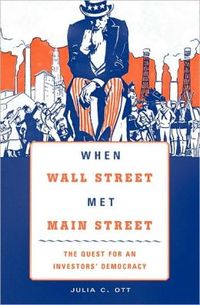

Purchase
When Wall Street Met Main Street
Julia C. Ott
The Quest for an Investors' Democracy
Harvard University Press
June 2011
On Sale: June 1, 2011
300 pages
ISBN: 0674050657
EAN: 9780674050655
Paperback
Add to Wish List
Non-Fiction
The financial crisis that began in 2008 has made Americans
keenly aware of the enormous impact Wall Street has on the
economic well-being of the nation and its citizenry. How did
financial markets and institutions—commonly perceived as
marginal and elitist at the beginning of the twentieth
century—come to be seen as the bedrock of American
capitalism? How did stock investment—once considered
disreputable and dangerous—first become a mass
practice? Julia Ott tells the story of how, between
the rise of giant industrial corporations and the Crash of
1929, the federal government, corporations, and financial
institutions campaigned to universalize investment, with the
goal of providing individual investors with a stake in the
economy and the nation. As these distributors of stocks and
bonds established a broad, national market for financial
securities, they debated the distribution of economic power,
the proper role of government, and the meaning of
citizenship under modern capitalism. By 1929, the
incidence of stock ownership had risen to engulf one quarter
of American households in the looming financial disaster.
Accordingly, the federal government assumed responsibility
for protecting citizen-investors by regulating the financial
securities markets. By recovering the forgotten history of
this initial phase of mass investment and the issues
surrounding it, Ott enriches and enlightens contemporary
debates over economic reform.
Comments
No comments posted.
Registered users may leave comments.
Log in or register now!
| 


 © 2003-2024 off-the-edge.net
all rights reserved Privacy Policy
© 2003-2024 off-the-edge.net
all rights reserved Privacy Policy